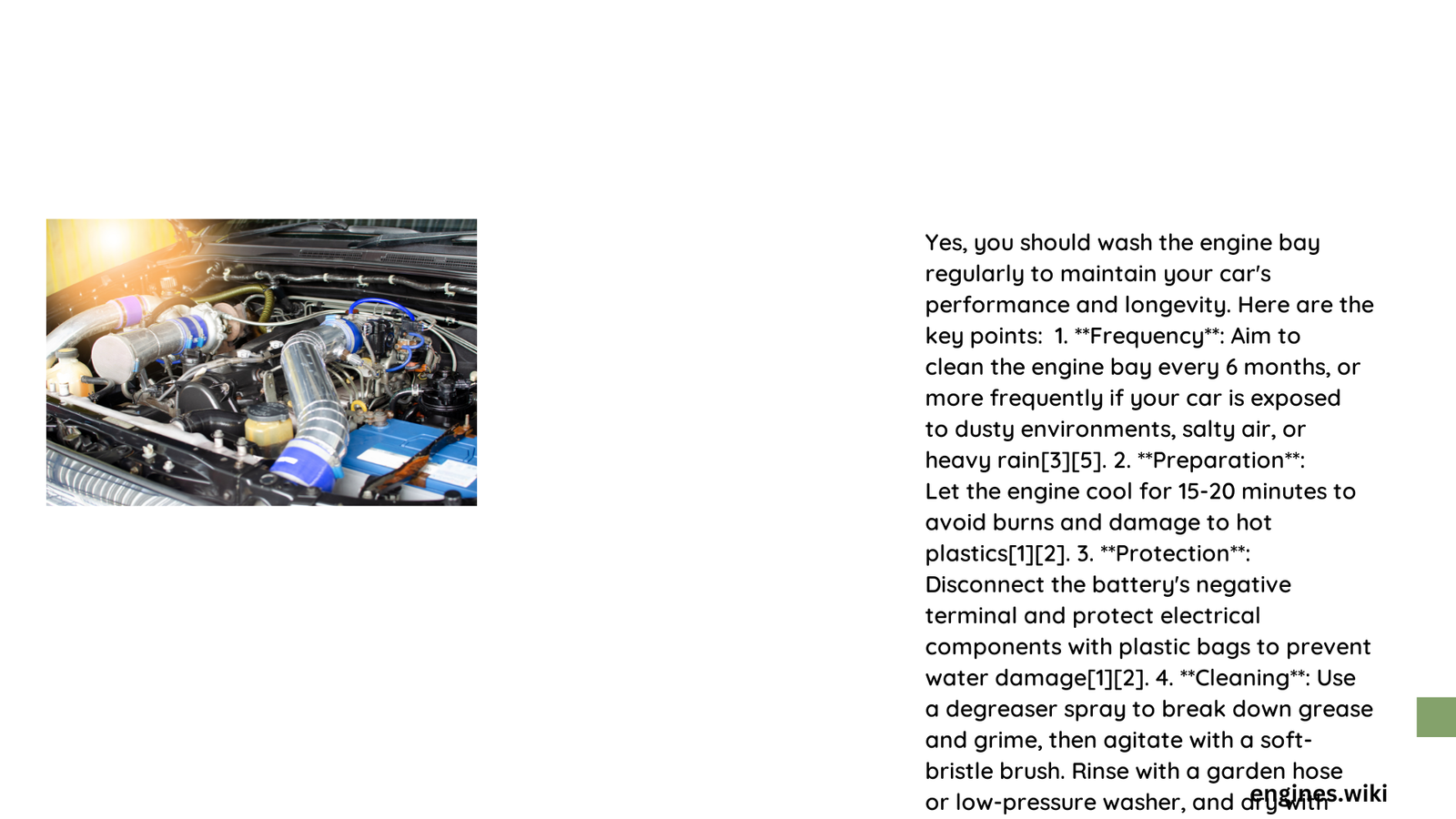Maintaining a clean engine bay is more than just aesthetic appeal—it’s a critical aspect of vehicle preservation. Regular engine bay cleaning prevents dirt accumulation, reduces potential mechanical issues, and helps identify early signs of wear or damage. By understanding proper cleaning techniques and potential risks, car owners can significantly extend their vehicle’s performance and lifespan.
Why Should You Wash Engine Bay?
What Happens When Engine Bay Accumulates Dirt?
Dirt and grime in your engine bay can cause multiple problems:
- Heat Retention: Accumulated debris prevents proper heat dissipation
- Accelerated Component Wear: Dirt acts like sandpaper on mechanical parts
- Potential Electrical Issues: Contaminants can compromise electrical connections
How Often Should You Clean Engine Bay?
| Environment | Cleaning Frequency |
|---|---|
| Urban Areas | Every 6 months |
| Dusty Regions | Every 3 months |
| High Moisture Areas | Every 2 months |
What Are the Primary Benefits of Engine Bay Cleaning?
Performance Enhancement
Cleaning your engine bay improves:
– Heat management
– Airflow circulation
– Overall engine efficiency
Preventive Maintenance
Regular cleaning helps:
– Detect potential leaks early
– Identify worn components
– Protect critical engine parts from premature degradation
What Tools Do You Need for Safe Engine Bay Cleaning?
Essential cleaning toolkit:
1. Specialized automotive degreaser
2. Soft-bristled brushes
3. Microfiber towels
4. Compressed air
5. Protective gloves
6. Plastic covers for sensitive electronics
What Precautions Should You Take?
Critical Safety Measures:
– Ensure engine is completely cool
– Disconnect battery
– Cover electrical components
– Use low-pressure water techniques
– Avoid direct water spray on electrical connections
What Professional Recommendations Exist?
Automotive experts recommend:
– Use biodegradable degreasers
– Apply protective sealants after cleaning
– Inspect components during cleaning process
– Dry thoroughly after washing
What Are Potential Risks of Improper Cleaning?
Risks include:
– Electrical system damage
– Corrosion of metal components
– Moisture-related mechanical failures
– Potential short circuits
How Much Does Professional Engine Bay Cleaning Cost?
| Service Level | Price Range |
|---|---|
| Basic Cleaning | $50 – $100 |
| Detailed Detailing | $100 – $250 |
| Comprehensive Service | $250 – $500 |
What Are Signs You Need Immediate Engine Bay Cleaning?
Warning indicators:
– Visible grease buildup
– Unusual burning smells
– Performance inconsistencies
– Visible fluid leaks
– Excessive dust accumulation
Expert Tips for Optimal Engine Bay Maintenance

- Use specialized automotive cleaning products
- Work in a well-ventilated area
- Take photographs before and during cleaning
- Be gentle with sensitive components
- Apply protective coatings after cleaning
Pro Tip: Consider professional detailing for complex or high-performance vehicles.
Final Recommendations
Washing your engine bay is not just recommended—it’s essential for maintaining your vehicle’s health and performance. By following proper techniques and being cautious, you can significantly enhance your car’s longevity and efficiency.
